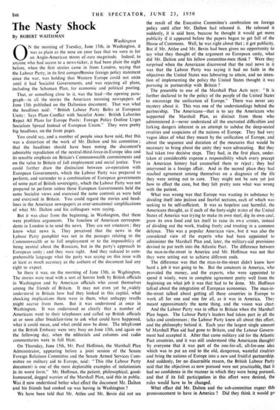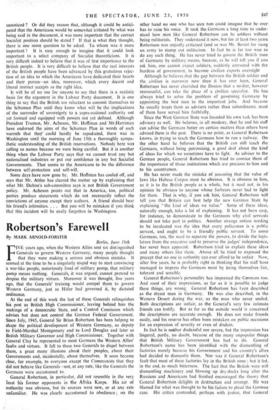The Nasty Shock
By ROBERT WAITHMAN Washington
ON the morning of Tuesday, June 13th, in Washington, it was as plain as the nose on your face that we were in for an Anglo-American storm of-rare magnitude. Indeed, to anyone who had access to a news-ticker, it had been plain the night before, when the first stories came in from London, saying that the Labour Party, in its first compretfbnsive foreign policy statement since the war, was holding that Western Europe could not unite until it had Socialist Governments, and was rejecting all plans, including the Schuman Plan, for economic and political pooling.
That, or something close to it, was the lead—the opening para- graph—in all the stories the American morning newspapers of June 13th published on the Daltonian document. That was what the headlines said: "British Labour Party Balks at European Unity: Says Plans Conflict with Socialist Aims: British Laborites Reject All Plans for Europe Pools: Foreign Policy Outline Urges Socialism Spread Instead of European Union." They were pretty big headlines, on the front pages.
You could say, and a number of people since have said, that this was a distortion of the work of Mr. Dalton and his committee ; that the headlines should have been noting the document's admirable repudiation of the neutral-third-force-in-Europe idea and its sensible emphasis on Britain's Commonwealth commitments and on the value to Britain of full employment and social justice. You could further draw the distinction between co-operation with European Governments, which the Labour Party was prepared to perform, and surrender to a combination of European governments of some part of British sovereignty, which the Labour Party was not prepared to perform unless those European Governments held the same Socialist views and exercised the same controls as were held and exercised in Britain. You could regard the stories and head- lines in the American newspapers as over-sensational simplifications of what Mr. Dalton and his colleagues were saying.
But it was clear from the beginning, in Washington, that these were profitless arguments. The function of American correspon- dents in London is to send the news. They are not amateurs ; they know what news is. They perceived that the news in the Labour Party pamphlet was not in the passages relating to the Commonwealth or to full employment or to the impossibility of being neutral about the Russians, but in the party's approach to European unity ; and they were right. And they reduced to com- prehensible language what the party was saying on this issue with at least as much accuracy as the authors of the document had any right to expect.
So there it was, on the morning of June 13th, in Washington. The stories were read with a sort of horror both by British officials in Washington and by American officials who count themselves among the friends of Britain. It may not even yet be ,widely understood in Britain how bad they looked in this capital, what shocking implications there were in them, what unhappy results might accrue from them. But it was understood at once in Washington. It was understood so clearly that a number of Americans went to their telephones and called up British officials at or soon after breakfast-time to ask what could have happened, what it could mean, and what could now be done. The telephones at the British Embassy were very busy on June 13th, and again on the following day, when the editorials and columns and radio commentaries were in full blast.
On Thursday, June 15th, Mr. Paul Hoffman, the Marshall Plan Administrator, appearing before a joint session of the Senate Foreign Relations Committee and the Senate Armed Services Com- mittee on military aid to Europe, said: " This (the Labour Party document) is one of the most deplorable examples of isolationism in its worst form." Mr. Hoffman, the patient, philosophical, good- humoured, dogged warrior of the Marshall Plan, said this in public. Was it now understood better what effect the document Mr. Dalton and his friends had cooked up was having in Washington ?
We have been told that Mr. Attlee and Mr. Bevin did not see the result of the Executive Committee's cerebration on foreign policy until after Mr. Dalton had released it. He released it suddenly, it is said here, because he thought it would get more publicity if it appeared before the papers began to get full of the House of Commons. Well, he was right about that ; it got publicity. But if Mr. Attlee and Mr. Bevin had been given no opportunity to say what they thought of the argument on European unity, what did Mr. Dalton and his fellow committee-men think ? Were they surprised when the Americans discovered that the real news in it was that the Labour Party was saying it had no faith in the objectives the United States was labouring to attain, and no inten- tion of implementing the policy the United States thought it was pursuing in partnership with Britain ?
The preamble to one of the Marshall Plan Acts says: "It is further declared to be the policy of the people of the United States to encourage the unification of Europe." There was never any mystery about it. This was one of the understandings behind the partnership. The Americans—that is to say the Americans who supported the Marshall Plan, as distinct from those who administered it—never understand all the encrusted difficulties and lurking dangers inherent in an attempt to subdue the deep-seated rivalries and suspicions of the nations of Europe. They had very vague ideas of what they meant by the unification of Europe, and about the sequence and duration of the measures that would be necessary to bring about the unity they were advocating. But they had taken two decisive steps. They had, in the first place, under- taken at considerable expense a responsibility which every precept in American history had counselled them to reject ; they had intervened in a foreign affair. And in the second place they had reached agreement among themselves on a diagnosis of the ills they were setting out to cure. They might not be sure yet just how to effect the cure, but they-felt pretty sure what was wrong with the patient.
What was wrong was that Europe was wasting its substance by dividing itself into jealous and fearful sections, each of which was seeking to be self-sufficient. It was as hopeless and harmful, the -Americans thought, as if each of the forty-eight states of the United States of America was trying to make its own steel, dig its own coal, grow its own food and tax itself to raise its own armies, instead of dividing out the work, trading freely and trusting in a common defence. This was a popular American view, but it was also the considered view of the experts who had been appointed to administer the Marshall Plan and, later, the military-aid provisions devised to put teeth into the Atlantic Pact. The difference between the man-in-the-street in America and Mr. Hoffman was not that they were setting out to achieve different ends.
The difference was that the man-in-the-street didn't know how hard a job it was going to be. But the amateurs in America, who provided the money, and the experts, who were appointed to spend it wisely, were in complete agreement pretty well from the beginning on what job it was that had to be done. Mr. Hoffman talked about the integration of European economies. The man-in- the-street talked about getting all these countries in Europe to work all for one and one for all, as it was in America. They meant approximately the same thing, and the vision was clear.
And the Labour Party was in office in Britain when the Marshall Plan began. The Labour Party's leaders had taken part in all the talks and conferences ; the Labour Party knew all about this effort, and the philosophy behind it. Each year the largest single amount of Marshall Plan aid had gone to Britain, and the Labour Govern- ment had accepted it. After that came military aid for the Atlantic Pact countries, and it was still understood (the Americans thought) by everyone that it was part of the one-for-all, all-for-one idea which was to put an end to the old, dangerous, wasteful rivalries and bring the nations of Europe into a new and fruitful partnership. And suddenly, for no discernible reason, the British Labour Party said that the objectives as now pursued were not practicable, that it had no confidence in the manner in which they were being pursued, and that if its full participation in this effort were desired, the rules would have to be changed.
What effect did Mr. Dalton and the sub-committee expect this pronouncement to have in America ? Did they think it would go
unnoticed ? Or did they reason that, although it could be antici- pated that the Americans would be somewhat irritated by what was being said in the document, it was more important that the correct Socialist position should be stated ? If that is what they thought, there is one more question to be asked. To whom was it more important ? It is easy enough to imagine that it could look important to a select company of Socialist theoreticians. It is very difficult indeed to believe that it was of first importance to the British people. It is very difficult to believe that the real interests of the British people have been advanced by this gratuitous rejec- tion of an idea to which the Americans have dedicated their hearts and their purses—an idea, moreover, which every decent and liberal instinct accepts as the right idea.
It will be of no use for anyone to say that there is a realistic basis for the argument in the Labour Party document. It is one thing to say that the British are reluctant to commit themselves to the Schuman Plan until they know what will be the implications of the surrender of sovereignty to a supra-national authority not yet formed and equipped with powers not yet defined. Although President Truman, Mr. Acheson, Mr. Hoffman and Mr.Harriman have endorsed the aims of the Schuman Plan in words of such warmth that they' could hardly be repudiated, there was in Washington until the morning of June 13th a thoroughly sympa- thetic understanding of the British reservations. Nobody here was calling us names because we were being careful. But it is another thing when the Labour Party says that we cannot trust any but nationalised industries or put our confidence in any but Socialist Governments. That seems to the Americans to be the difference between self-protection and self-will.
Some days have now gone by. Mr. Hoffman has cooled off, and says that Mr. Attlee has cleared the matter up by explaining that what Mr. Dalton's sub-committee says is not British Government policy. Mr. Acheson points out that in America, too, political parties produce statements which do not necessarily reflect the convictions of anyone except their authors. A friend should bear his friend's infirmities. . . . But you will be mistaken if you think that this incident will be easily forgotten in Washington.



































 Previous page
Previous page